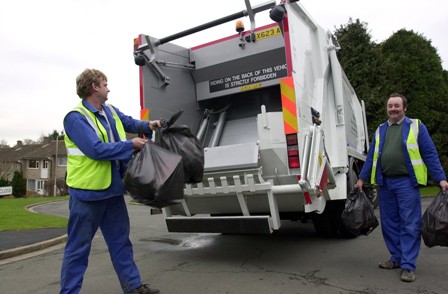Local authorities are required to comply with a wide range of waste and recycling legislation.
In England and Wales, two tier local authorities (such as cities and districts) are obliged by law to provide a domestic waste collection service to households, while county councils must handle its disposal. Unitary authorities meanwhile must undertake both. These duties are laid out in the Environmental Protection Act (EPA) 1990.

Many councils also offer waste collection services to businesses for which they can charge. This is exempt from VAT.
The range of premises for which councils can charge for both collection and disposal costs was extended in 2012 to include institutions such as prisons and campsites, which were previously entiteld to free waste disposal. This was after a legal loophole in the Controlled Waste Regulations – known as Schedule 2 – was amended.
Councils can require occupiers of premises to present their household waste for collection in a specified way under the EPA. However, councils’ powers to enforce this were scaled back in England in March 2015 by the Deregulaton Act which downgrades failure to comply with any notice from a criminal to a civil offence.
Like businesses, local authorities have a Duty of Care to handle waste responsibly but they also have a range of other responsibilities which specifically relate to municipal waste. Much of this regulation derives from the European Union.
Waste Framework
One of the key pieces of legislation is the Waste Framework Directive 2008 which sets the basic concepts and definitions related to waste management, such as definitions of waste and recycling and a legally-binding five step waste hierarchy.
Importantly for local authorities, the Directive includes targets for member states to reuse and recycle 50% of household waste by 2020.
The recycling rate for waste from households in England stood at 44.5% in 2013/14, while local authorities in Scotland recycled 42.2% in 2013. While a stronger performance was recorded in Wales (54% in 2013/14), this shows there was a still long way for the UK to go. If the targets are missed, there are provisions in the Localism Act for any fines imposed by the EU to be passed down to local authorities.
TEEP
The Waste Framework directive also requires councils, as of January 2015, to provide separate collection of paper, plastics, metal and glass.

In England, separate collections are required where they are technically, environmentally and economically practicable (TEEP) and appropriate to meet the necessary quality standards for the relevant recycling sectors. Local Authorities are required to conduct an Assessment to determine the route they take and to justify comingled collection if that is what they have chosen. Although there is no official Defra guidance on this, a Route Map was published in 2014 to help councils understand their legal obligations.
The WFD is implemented in England and Wales through the Waste (England and Wales) Regulations 2011 which were later amended in 2012. Scotland and Northern Ireland have a separate approach.
Landfill
Another important piece of EU legislation which impacts upon local authorities is the Landfill Directive. This requires the UK to reduce the amount of biodegradable municipal waste sent to landfill, with targets set for 2010, 2013 (both met) and 2020.
Significant progress against the targets was achieved through the introduction of a landfill trading mechanism known in England as the Landfill Allowance Trading (LATS) scheme and Landfill Allowance Scheme in Wales, but in England LATS was abolished in 2013.
It is now widely recognised that landfill tax – which stands at £82.60 for 2015/16 – currently acts as the biggest incentive for local authorities to divert material from landfill.




